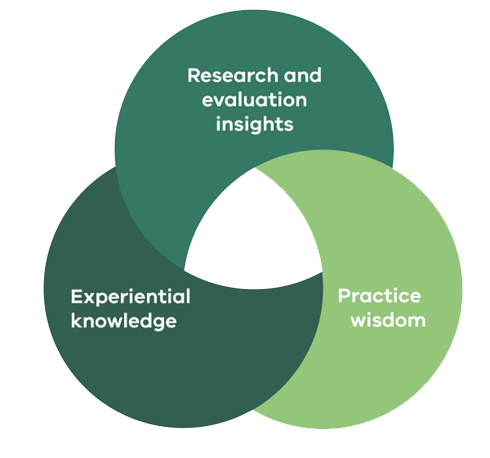What is transformative evidence?
Ongoing dialogue between researchers, practitioners, consumers and their carers, families, supporters and kin ensures different types of evidence and experience are captured and embedded in the cycles of learning. This includes the experiential knowledge of people with lived and living experiences, practice wisdom from those working in care settings and research insights and evidence from academics and researchers. Collectively we refer to this as ‘transformative evidence’. You can learn more about each type of evidence in the sections below.

What do we mean by experiential knowledge?
As a consumer, experiential knowledge refers to the knowledge, insights and understandings acquired through personal experience of mental ill-health or psychological distress, as well as the insights gained through experiences of service use and periods of healing and/or recovery.
As a carer, family member, supporter or kin, experiential knowledge refers to the knowledge, skills, insights and understanding acquired through the experience of supporting someone through mental-ill health or psychological distress.
Carers, family members, supporters or kin may also have knowledge, insights and understanding of navigating the mental healthcare system, developing coping strategies, seeking and utilising services to manage the emotional impacts of supporting someone who is experiencing mental health challenges—such as managing changes in relationships, balancing caregiving responsibilities with other aspects of life, and advocating for the needs and rights of the person that they are supporting.
What do we mean by practice wisdom?
Practice wisdom refers to the knowledge, skills, insights and understanding that mental health and wellbeing practitioners gain through their direct experiences of working with people experiencing mental health challenges, as well as consumers, families, carers, supporters and kin. Mental health and wellbeing practitioners include:
- Aboriginal health and/or mental health practitioners
- Alcohol and other drug workers
- Carer or family peer support workers
- Case managers
- Consumer peer workers
- Counsellors
- Emergency services
- Lived experience workers
- Medical practitioners
- Nurses
- Occupational therapists
- Psychologists
- Psychiatrists
- Social workers
Each discipline has a unique scope of practice, which may or may not include the following skills and knowledge: the ability to make informed intuitive decisions based on a person's presentation (e.g., diagnosis, interventions or therapeutic approaches, developing a treatment plan), building rapport, trust, safety, confidentiality, transparency, and therapeutic relationships with consumers and carers, through being culturally responsive, and building empowerment, engagement, strong communication and relational alliances.
What do we mean by research and evaluation insights?
The use of translational research to share findings and improve practice can be considered to involve ‘cycles of learning’. The Royal Commission explained how cycles of learning that translate new knowledge into practice can benefit the experiences and outcomes for consumers, carers, families, supporters and kin. At a high level, cycles of learning include:
- research to establish an evidence base about effective models of mental health care.
- the capacity for innovation to test and expand the evidence base with new ideas.
- processes to capture new knowledge and ideas and translate these into practice for the benefit of mental health professionals and consumers.
- capabilities to monitor and evaluate the effectiveness and outcomes of new and established approaches to care.
- methods to curate and share information from many sources, and to use this to inform decisions and policy development for improvements across the Mental Health and Wellbeing system[1]
[1] Royal Commission into Victoria’s Mental Health System, Final Report, Vol 5, p. 128.
